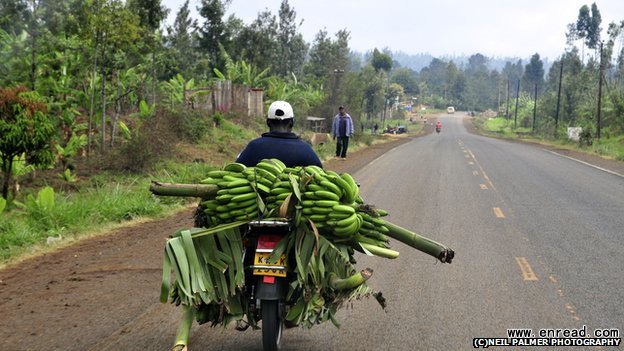| ||||||||||||||||||||||||||||||||||||||||||||||||
|
Climate change could lead to bananas becoming a critical food source for millions of people, a new report says.
一份新报告称,气候变化可能导致香蕉成为数百万人一个重要食物来源。
 Bananas could take the place of potatoes in some developing countries Researchers from the CGIAR agricultural partnership1 say the fruit might replace potatoes in some developing countries.
Cassava and the little known cowpea(豇豆) plant could play increasingly important roles in agriculture as temperatures rise.
Responding to a request from the United Nations' committee on world food security, a group of experts in the field looked at the projected effects of climate change on 22 of the world's most important agricultural commodities.
Blooming bananas
They predict that the world's three biggest crops in terms of calories provided - maize3(玉米), rice and wheat - will decrease in many developing countries.
They suggest that the potato, which grows best in cooler climates, could also suffer as temperatures increase and weather becomes more volatile4(不稳定的).
The authors argue that these changes "could provide an opening for cultivating certain varieties of bananas" at higher altitudes, even in those places that currently grow potatoes.
Dr Philip Thornton is one of those behind the report. He told BBC News that while bananas also have limiting factors, they may be a good substitute for potatoes in certain locations
"It's not necessarily a silver bullet but there may be places where as temperatures increase, bananas might be one option that small holders5 could start to look at."
The report describes wheat as the world's most important plant derived6 protein and calories source.
But according to this research, wheat will face a difficult future in the developing world where higher prices for cotton, maize and soybeans have pushed wheat to marginal land, making it more vulnerable to stresses induced by climate change.
One substitute, especially in South Asia, could be cassava which can tolerate a range of climate stresses.
But how easy will it be to get people to adjust to new crops and new diets?
Bruce Campbell is program director of the climate change, agriculture and food security research group (CCAFS) which co-ordinates work among leading institutions around the world. He told BBC News that the types of changes that will happen in the future have already happened in the past.
"Two decades ago there was almost no rice consumption in certain areas of Africa, now there is. People have changed because of the pricing, it's easier to get, it's easier to cook. I think those sort of shifts do occur and I think they will in future."
点击  收听单词发音 收听单词发音
|
||||||||||||||||||||||||||||||||||||||||||||||||
上一篇:缅甸罂粟种植面积不断增长 下一篇:澳洲某士兵被授予维多利亚勋章 |
||||||||||||||||||||||||||||||||||||||||||||||||
- 发表评论
-
- 最新评论 进入详细评论页>>



